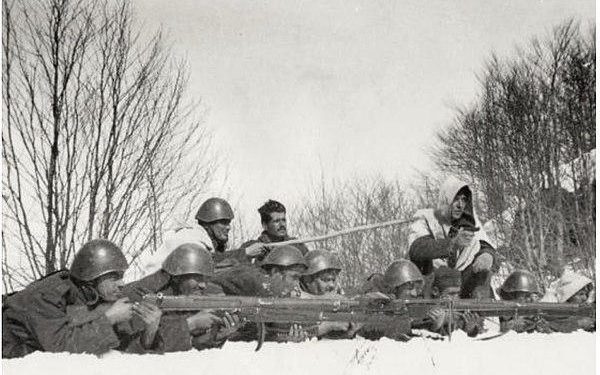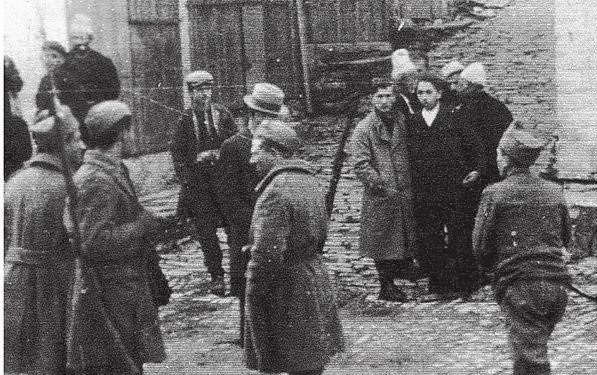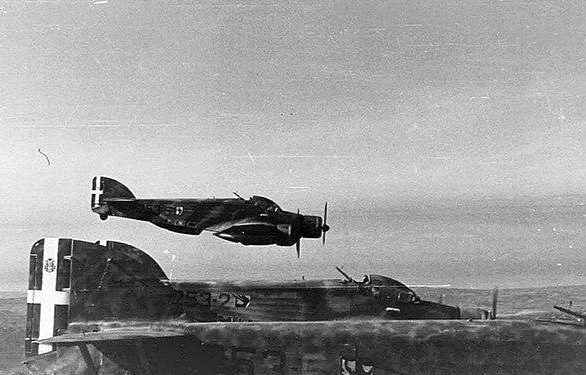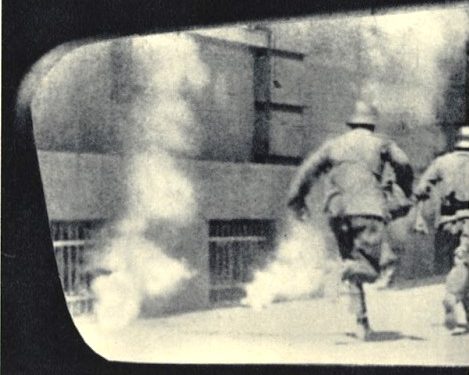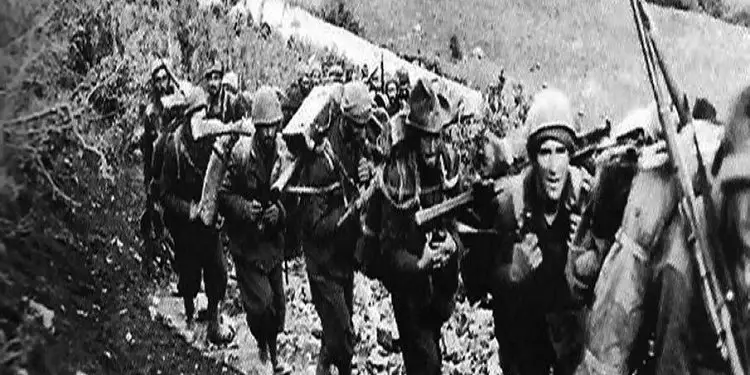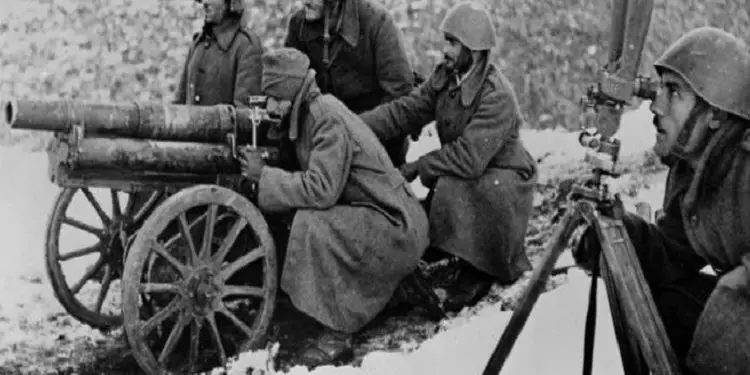Part Two
Memorie.al /The War Diaries of the Supreme Command of the German Armed Forces (Kriegstagebuch des Oberkommandos der Wehrmacht, KTB OKW), in the years 1940-1945, were kept by the National Defense Office at the Operations Headquarters of the German Armed Forces (Abteilung Landesverteidigung im Wehrmachtführungsstabamt). These war diaries describe strategies, battles, troop movements, front lines, objectives, operational decisions and war plans and assessments of combat situations, by the highest leadership of the German military forces. The Secretary of the War Diaries at the Supreme Command of the German Armed Forces was Helmuth Greiner until March 1943 and then Percy Ernst Schramm. In the years 1961-1965 the war diaries were compiled by historians and published by the publishing house Bernard & Graefe Verlag für Wehrëesen, Frankfurt am Main. The chief historian was Percy Ernst Schramm and his assistant historians, respectively by volume, were as follows:
Continued from the previous issue
B Ditar Lufte
Page 273 – 22.01.1941. The position of the commander of the Supreme Command of the Armed Forces (K.S.F.A.) regarding the assessment of General Guzzoni is given: “It is almost impossible for the Italians to prepare the necessary troops in time for an attack on Albania. Therefore, Italian support for the German attacks launched from Bulgaria against Greece should no longer be counted on”.
Page 274 – 22.01.1941. The Italians call the sending of German troops to Albania desirable, but not necessary.
Page 275 – 22.01.1941. Therefore, it makes no sense to send troops to Albania now. If the front remains there without moving, there would be undesirable psychological consequences. If troops are introduced, then the war will start in the southeast before long.
Page 280 – 25.01-.1941. Entry of Greek troops into Albania.
Page 289 – 29.01.1941. There are 24 Italian Divisions in Albania.
Page 290 – 30.01.1941. The situation in Albania seems to be stable.
Page 292 – 31.01.1941. Report dated 29.01.1941, by General Rintelen. Guzzoni’s data on Albania and Libya.
Page 305 – 05.02.1941. German troops in Libya and Albania, only if there are troops there, will be tactically placed directly at the service of the Italian commands. These troops are under the command of the Commander of the Ground Forces, who, through the liaison officer, is in contact with the Italian command in the field.
Page 307 – 06.02.1941. The III Special Purpose Fighter Squadron in Foggia will be under the command of the X Air Corps only, to supply the German ground forces in North Africa. It is necessary to make a new planning of the Italian transports to Albania in time.
Page 322 – 13.02.1941. There are no significant combat operations in Albania.
Page 324 – 14.02.1941. The main point of support for the British air forces is Crete. From there, with the help of other airports in Greece, the strikes in Albania are carried out.
Page 326 – 15.01.1941. Since the situation on the front in Albania is stable and no significant success is expected at this time of year in the event of an attack, even by German troops, no German troops will be kept on standby for this region.
Page 343 – 04.03.1941. Letter from General von Rintelen, on the conversation with Guzzoni. General Cavallero will begin a small attack on Albania on 06.03.1941. The Duchy, who is now in Albania, has ordered instead an attack by the XI Army on the 8th or 9th on the city of Gjinokastra. Unconfirmed news about the landing of 2 British divisions in Greece.
Page 346 – 06.03.1941. General von Rintelen has received orders to be very withdrawn. For this reason, the Italians have postponed their attack on Albania.
Page 351 – The infantry division reached the Bulgarian-Greek border. The attack in Albania began on 09.03.1941 with the XXV, VIII and IV Corps of the ground forces. Italian attacks on the morning of 09.03.1941. The Italian attack in Albania, under the command of the Duce.
Page 353 – 12.03.1941. Few successes of the Italians in Albania.
Page 356 – 13.03.1941. The Italian attack in Albania ends.
Page 363 – 18.03.1941. There are 25 Italian divisions in Albania, compared to 16 Greek divisions. According to General Von Rintelen, the striking power of the Greeks is decreasing. The impression is created that the British are landing troops in Greece and apparently in the northern part of the Peloponnese.
Page 365 – 21.03.1941. Signing of the agreement with Yugoslavia. A small ground forces liaison headquarters will go to Albania, headed by Colonel Fretter-Pico.
Page 371 – 31.03.1941. The situation of the Italians in Albania before the start of operations against Yugoslavia seems difficult. The Italians prepare 1 tank division and 2 infantry divisions, near the Yugoslav border. 3 British divisions in Greece. Abyssinia was lost.
Page 373 – 01.04.1941. Two Italian divisions are sent to Albania.
Page 374 – 02.04.1941. Greek attacks in Albania.
Page 374 – 03.04.1941. Separate Greek attacks in Albania. 3 Divisions from the XIth Army, 1 Division from the IXth Army, 2 Divisions from Italy are sent to protect the eastern and northern borders. The Duce is looking for German officers for these Divisions.
Page 375 – 05.04.1941. General von Rintelen meets on 03.04.1941 in Albania with General Cavallero; reports on the aims and groupings of the Italian forces.
Page 376 – 07.04.1941. Communication with Albania and Libya is interrupted.
Page 380 – 14.04.1941. Withdrawal movement of Greek troops in Albania.
Page 380 – 15.04.1941. Complete withdrawal of Greeks from Albania.
The diary ends on 30 December 1941.
APPENDIX
Page 948 – 22.08.1939. Hitler’s speech at the Berghof: …. In the Balkans, since the invasion of Albania by Italy at Easter 1939, there has been a balance of forces.
Page 1181 – 28.10.1940. Time 05:30. Beginning of the Italian attack on Greece. The 9th and 11th Armies participate (7 Divisions, including an Alpine Division and a Tank Division; 1 Division to secure the border with Yugoslavia). The Greek Army (General Papagos) has mobilized about 300,000 men. Italian air attacks against Greek airports, including Tatol airport near Athens, as well as the ports of Preveza and Patras. 56 fighter planes, 120 gunners, 17 reconnaissance planes in Albania; 112 fighter planes, 24 gunners and 18 reconnaissance planes in Puglia [Italy].
Page 1182 – 09.11.1940. General Soddu becomes commander-in-chief of the Italian troops in Albania. ….. A group of English ships (3 cruisers and 2 attack ships) attacked Italian ships returning from Albania and sank 4 transport ships, with a carrying capacity of 16,938 tons.
Page 1183 – 14_22.11.1940. The Greek attack culminates with the capture of Korça in Albania on 21.11.1940.
Page 1184 – 26.11.1940. Due to the losses in Albania, Mussolini gives a new order to mobilize the Italian army.
Page 1186 – 10.12.1940. Order of the K.S.F.A. to deploy the X Air Corps in Sicily and Southern Italy. Admiral Canaris [head of German military intelligence – ed.] asked the Hungarian ambassador in Madrid to act as a mediator for peace with Greece. If Greece were to return to neutrality, it would be allowed to keep the occupied parts of Albania.
Page 1187 – 19.12.1940. The British warships “Warspite” and “Valiant” shell Vlora in Albania.
Page 1188 – 28.12.1940. Italy seeks German support in Albania. Hitler initially considers sending an Alpine Division, but then gives up.
Page 1188 – 30.12.1940. General Count Cavallero takes command of the Italian troops in Albania, replacing General Soddu, who is ill. There are now 16 Italian Divisions in Albania, compared to 13 Greek Divisions.
Page 1196 – 09.03.1941. The beginning of an Italian attack on the Albanian front.
Page 1197 – 16.03.1941. The Italian attack launched on 09.03.1941 in Albania, suffered final defeat.
Page 1202 – 14.04.1941. The beginning of the withdrawal of the Greek troops fighting in Albania.
Page 1203 – 21.04.1941. General Wilhelm List accepts the capitulation of the Greek troops in Larissa. The German SS troops, coming from the south from Greece, meet on the Albanian border with the Italians coming from the north from Albania.
Volume II
1 January – 31 December 1942
Page 446 – 24.06.1942. The Chief of Staff for Southeast Europe, Major General Foertsch, arrives for talks at Hitler’s headquarters. At his request, instructions are given to the German general at the Italian General Staff to influence there so that the liaison officer of the Italian High Command 11 [in Greece], who is at the German headquarters for Southeast Europe, is also given the task of liaison officer for the High Command 9 (Albania) and for the military government of Montenegro.
Volume III
January 1, 1943 – December 31, 1943
Page 275 – 03.04.1943. Description of the situation in Croatia: ….. The communist brigades IV and V, about 2500 people, are trying to enter Albania. The Chetniks have taken up positions on the Gacko-Bileça road (37 km north-east of Dubrovnik), with a front from the north-west.
Page 286 – 05.04.1943. Albania: It is said that in isolated places there are demonstrations of Albanians in support of Germany, against the Italians. 15 km, east of Valona (coastal city 100 km south-southwest of Tirana), attack on an Italian column: 10 dead, 19 wounded, 103 missing.
Page 301 – 08.04.1943. Italian occupied area: According to a news report from the intelligence forces, 10,000 communists are staying in an area west of Foça [in eastern Bosnia], and will try to enter Albania.
Page 316 – 09.04.1943. Italian occupied area: A powerful enemy force is being assembled in the Gacko area [in eastern Bosnia], with the aim of entering Albania.
Page 336 – 15.04.1943. Two attacks on the Italian occupation troops in southern Albania. A stronghold was captured and the barracks burned.
Page 341 – 16.04.1943. The Italians undertake with numerous forces, in the area 40 km. southeast of Vlora, a purge of the bandit center there.
Page 346 – 17.04.1943. The Italian purges continue southeast of Vlora.
Page 351 – 18.04.1943. Albania: The Italian purges continue in the south.
Page 360 – 20.04.1943. Italian purges continue south of Vlorë. Several communist centers are destroyed and cannon is captured.
Page 423 – 03.05.1943. On 29.04.1943, the Albanian government resigned.
Page 454 -09.05.1943. Fighting north of Vlorë, 10 enemies killed, few weapons captured.
Page 502 – 19.05.1943. In the northeast of Leskovik (southeastern border of Albania), Italian battalions are attacked by strong bandit troops. Italian losses: 3 dead, 25 wounded. 50 enemies killed.
Page 544 – 27.05.1943. The Mediterranean Front in the Southeast: A document found in the headquarters of Dragoljub “Drazha” Mihailović, proves that his movement has extensive connections with the insurgent movement in Albania. [In the memoirs of the German ambassador to Albania during the war, Martin B. Schliep, Muharrem Bajraktari of the Luma area near Kukës is mentioned, for connections with Dragoljub “Drazha” Mihailović. – ed. note]
Page 552 – 28.05.1943. Albania: From 01.06.1943 [there will be] an Italian military group, based in Tirana. General Commander, Rossi.
Page 558 – 29.05.1943. Albania: On 26.05.1943, bomb attack on two pro-Italian Albanian leaders. Bandits set fire to mines southwest of Lake Ohrid and took the workers with them.
Page 581 – 02.06.1943. Albania: A bandit attack (200 people) on an airport is repelled.
Page 587 – 03.06.1943. Albania: Night flights, south-north of the enemy, return from the south.
Page 592 – 04.06.1943. Albania: No special events.
Page 613 – 08.06.1943. Albania: In the night as dawn broke on 07.06.1943, numerous enemy flights.
Page 648 – 15.06.1943. Italian troops of the IVth Army Corps are undertaking sweeps against the insurgents in the area south of the Tirana-Durres line. The insurgents have suffered heavy losses.
Page 653 -16.06.1943. 85 enemies killed during Italian purges, in the southern area of the Tirana-Durrës line.
Page 658 – 17.06.1943. Albania: 35 enemies killed during Italian purges; two machine guns captured.
Page 664 – 18.06.1943. 64 enemies killed during Italian purges in the southern area of Tirana-Durrës, about 60 arrested, a small quantity of weapons captured. East of Tirana, a militia bodyguard was attacked. North of Valona (105 km. southeast of Tirana) a gendarmerie barracks was attacked by a communist troop of 200. The gendarmes were taken prisoner.
Page 685 – 22.06.1943. Greece: At dawn on 22.06.1943, the telephone connection between Ioannina and Athens, Preveza (75 km. south of Ioannina) and Albania was completely cut off due to sabotage.
Page 690 – 23.06.1943. During the fighting in north-east Albania and north-west of Krushevo (120 km. east of Tirana), 22 enemies were killed. South of Dibra (60 km. north-east of Tirana), an Italian column and bodyguard were attacked. The Italians suffered losses. Overall completion of the purges in the area south of Tirana-Durrës: 69 enemies killed, 198 arrested.
Page 697 – 24.06.1943. Communist attack on an Italian company and a mine east of Tirana.
Page 708 – 26.06.1943. Successful attack by Italian troops on a bandit nest west of Korça (120 km. southeast of Tirana).
Page 713 – 27.06.1943. In the northwest of Tepelena (110 km. southeast of Tirana) a bandit group is destroyed, with the help of the Italian air force.
Page 717 – 28.06.1943. During the fighting northwest of Tepelena (110 km. southeast of Tirana) 102 Italians killed and enemy losses are also thought to be high. During the purges in the Berat-Fier-Valona area (area 50 km. south of Tirana), 13 enemies killed.
Pages 767-768 – 10.07.1943. German troops located or to be deployed in the area of the [Italian] XIth Army, if they engage in combat, will be under the high command of the XIth Army, while German troops located in Crete, Montenegro, Albania and the Aegean, for coastal defense or other operations, will be under the command of the responsible Italian troops. The Italian troops of the IIIrd Army Corps (Brennero, Forli and Pinerolo Divisions, with support and rear troops), will be relocated in August to Albania. Memorie.al




